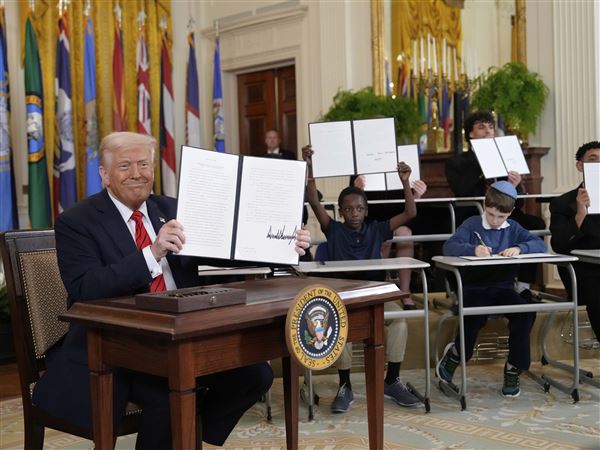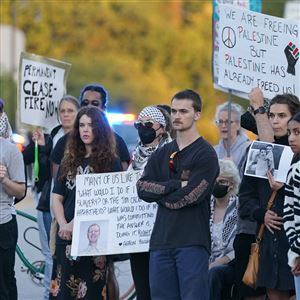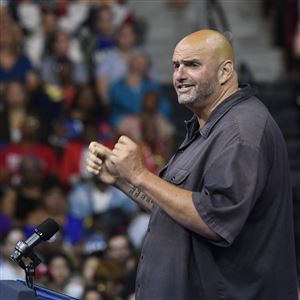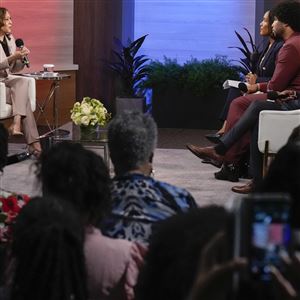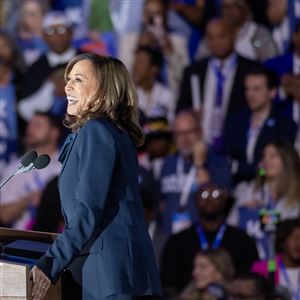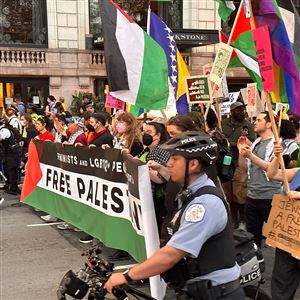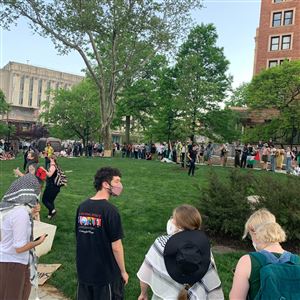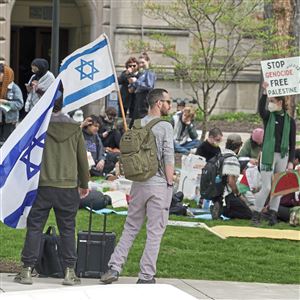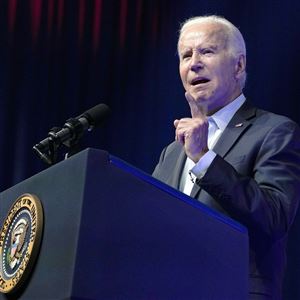The Hamas attack against Israel a year ago Monday and the ensuing war in the Mideast has shaken both Jewish and Arab American voters, potentially playing a decisive role in tight races for the White House and U.S. Senate in Pennsylvania.
Ongoing fighting in the Middle East has ensured the war will remain on the agenda of the 2024 presidential election during the final weeks of the campaign.
“For Jews, anybody who’s concerned about friends or family or the state of Israel is thinking about Israel at this point in time,” said Marcia Bronstein, regional director for the American Jewish Congress. “It’s on everybody’s mind.”
Among Arab Americans, 81% called the war in Gaza as a top concern ahead of the election, according to the Arab American Institute.
And that makes Israel a potent campaign issue in the race between Vice President Kamala Harris and former President Donald Trump.
Nowhere could that have a greater impact than in Pennsylvania, where polls show the presidential race dead even.
The Keystone State is home to more than 430,000 Jewish residents, behind only New York, California, Florida and New Jersey, according to the American Jewish Year Book — and most Jews regularly support Democrats because their positions on domestic issues align with that party.
“American Jews live in America and at the end of the day generally vote on issues that affect them in the United States,” said Democratic strategist Joel Rubin, a Pittsburgh native now living in Washington, D.C. “Republicans are trying to make it about Israel because on domestic [issues], they know that they lose the Jewish vote.”
At the same time, U.S. Sen. Bob Casey, D-Pa., is trying to fend off a strong challenge from former hedge fund CEO David McCormick in a race that could determine which party controls that chamber in January.
“Certainly American politicians had hoped the war would be over long before now so it would all be forgotten before the election,” said Jonathan Sarna, a professor of American Jewish history at Brandeis University.
But as Jews continue to celebrate the High Holidays, which began with Rosh Hashanah last week and culminate with Yom Kippur beginning on Friday night, the ongoing war that began on Oct. 7, 2023, has made Israel a bigger concern.
That has reinforced the article of faith among Trump and his fellow Republicans that support of Israeli government policies would translate into increased support from Jewish Americans.
The Republican Jewish Coalition has earmarked more than $20 million, including a $15 million ad campaign, to make it happen, with Pennsylvania getting the largest share.
“Clearly, the recent history has really amped up everybody’s feeling about the election,” said Scott Feigelstein, the RJC’s regional director for Pennsylvania and Southern New Jersey. “Oct. 7 was clearly an awareness point. That heightened everybody’s importance about voting for the right candidate.”
The question is which candidates will benefit.
No clear movement
So far, there is no evidence that Jews are moving from their traditional home in the Democratic Party.
“The Republicans have been unable to woo a significant number of Jewish voters based upon their policies on domestic issues,” Mr. Rubin said. “The agenda just doesn’t work for the Jewish community.”
In a Pew Research Center poll released last month, 65% of Jewish Americans either supported Ms. Harris or were leaning that way, compared with 34% who said the same about Trump.
But with a margin of error of 6.6 percentage points, that breakdown isn’t much different than Pew’s 2020 survey of Jewish Americans, which found that 68% of those who identified their religion as Jewish backed the Democratic Party while 28% supported the GOP.
“Given the margins of error around the relatively small number of Jews in most national surveys, anything less than a difference of 10 percentage points is unlikely to be statistically significant,” said Alan Cooperman, Pew’s director of religion research.
Four years ago, more than two-thirds of Jewish voters supported Joe Biden for president over Donald Trump, backing him by 69% to 30%, according to AP VoteCast.
Guy Ziv, a professor at American University and associate director of its Center for Israel Studies, said he didn’t expect the numbers to change too much this fall.
“The vast majority of Jews in Pennsylvania are going to be supporting Kamala Harris. I would be very surprised if it’s anything but a clear majority,” he said.
Conservative efforts remain
To attract those voters, Republicans point to Trump’s record on Israel; as president, he moved the Israeli embassy to Jerusalem and negotiated the Abraham Accords among Israel, the United Arab Emirates and Bahrain, then obtained agreements with Morocco and Sudan.
“The Jewish community feels there’s somebody who’s actually going to act strong on the issues,” said Mor Greenberg of Squirrel Hill, director of public affairs at Coldspark, a Pittsburgh-based Republican consulting firm.
Trump plans a remembrance event at his Doral golf club on the first anniversary of the attack, when Hamas killed 1,200 people and took more than 200 hostages, including some Americans.
Ms. Greenberg said she is seeing “the fraying of that monolithic Democratic voting bloc” of Jewish Americans. “They are prioritizing Israel and fighting antisemitism,” she said. “You hear people saying, ‘I’m voting Republican for the first time.’”
Many Democrats have stood behind Israel as well. President Biden traveled to Israel when the war broke out and supplied its military with weapons. Both he and Ms. Harris have issued statements of support for the Jewish state.
Republicans said they also believe that increased antisemitism will drive Jews to the GOP. The Anti-Defamation League reported 8,873 antisemitic incidents in the U.S. last year, with 5,204 incidents occurring between the Oct. 7, 2023, attack and the end of 2023.
“We see it in the polling,” said Sam Markstein, a spokesman for the Republican Jewish Coalition. “This is deeply personal. It’s deeply visceral for Jewish Americans.”
Still, the White House under Mr. Biden released the first-ever national strategy to combat antisemitism and Ms. Harris’ husband, Douglas Emhoff, is Jewish.
And Trump himself has used what Anti-Defamation League CEO Jonathan Greenblatt called “numerous antisemitic tropes and anti-Jewish stereotypes — including rampant allegations of dual loyalty.”
“What I hear most frequently among the center right-to-right crowd is even if they believe that Donald Trump may be stronger on Israel, they cannot get over the fact that he engages in so much of his own antisemitism,” said Jill Zipin, co-founder and chair of Democratic Jewish Outreach Pennsylvania.
Last month, Trump told the Israeli American Council: “If I don’t win this election — and the Jewish people would really have a lot to do with that if that happens — because at 40% it means 60% are voting for the enemy,”
The American Jewish Committee called such comments “outrageous and dangerous.”
Mr. Markstein said Trump was just saying the obvious — that he will lose without Jewish support. “It means Jewish voters matter, especially in these key battleground states,” he said.
The trouble with Harris
Ms. Harris also faces pressure from Muslim Americans, including those in Pennsylvania.
They have demanded an immediate ceasefire and expressed anguish over the widespread destruction in Gaza, where more than 41,000 people have died and nearly 100,000 have been injured, including 16,500 children, according to the Hamas-run Gaza Health Ministry. Israel says at least 17,000 of the dead were Hamas fighters.
In the presidential primaries, more than 700,000 voters cast their ballots for “uncommitted” at the behest of opponents of the White House’s support for Israel. according to the Green Papers and NBC News. (Mr. Biden received 14.5 million.) Pro-Palestinian demonstrators came to the Democratic National Convention Chicago in August, although the police estimate of 3,500 was far below what organizers expected.
Ms. Harris’ loudest applause at the convention came when she combined her calls for Israel to be secure and the hostages released with Palestinians able to “realize their right to dignity, security, freedom and self-determination.”
James Zogby, founder and president of the Arab American Institute, said polling by the group in the last year has shown a break with the Democratic Party because of the administration’s response — or lack thereof — to the carnage in Gaza.
The institute’s poll shows that party identification is now tied at 38% between the two major parties, while two-thirds of U.S. Muslims identified as Democratic or Democratic-leaning in 2017.
“I’ve never seen anything like this, and I’ve been doing this for 50 years,” Mr. Zogby said. “This has struck a chord in a very significant way, across the board.”
No ceasefire, no vote
The absence of a Palestinian American speaker at this year’s Democratic convention was a missed opportunity to rebuild Arab American trust and was “a grave disservice” to Ms. Harris’ chances, Mr. Zogby said.
The uncommitted movement has ballooned into a larger effort, “No Ceasefire No Vote PA,” to get Pennsylvanians to pledge not to support Ms. Harris unless she calls for a permanent ceasefire in Gaza and publicly agrees to stop arms to Israel.
“I’ve voted Democrat in every Pennsylvania election since I was 18, and for the first time, I’m finding myself in the position of being unable to vote for the Democratic nominee because of her ongoing support of the current administration’s policy of unconditionally funding and arming Israel’s genocide in Gaza,” said Reem Abuelhaj, a Palestinian American and Pennsylvania resident who is an organizer and spokeswoman for the group
“This is a real power that Pennsylvania voters have in a swing state where we know the margins will be slim,” Ms. Abuelhaj said. “We see this as an opportunity to pressure the administration to take action to secure a permanent ceasefire, but also to earn back those votes and secure victory in November.”
Christine Mohamed, executive director for the Council on American–Islamic Relations Pittsburgh, said she sees the same sentiment here. “A lot of what I’m hearing in the community is that this is the line in the sand for them,” she said.
Adria Lawrence, a professor of political science at Johns Hopkins University who specializes in Middle Eastern and North African conflict, warned that not supporting Ms. Harris could backfire.
“It’s quite possible that there will be real, on-the-ground consequences for Palestinians if Trump wins,” she said.
Ms. Harris met with Muslim and Arab American leaders Friday in Flint, Mich., according to a campaign official. She expressed her concern over the suffering by Gaza residents and civilian casualties in Lebanon, and discussed her efforts to bring about a ceasefire and release of the hostages being held by Hamas, the official said.
The fallout from the war and the subsequent rise in antisemitism also is spilling over into the Casey-McCormick Senate race.
Last month, 400 people came to hear Mr. McCormick and RNC CEO Matt Brooks speak about Israel at an event in Philadelphia, U.S. Sen. Lindsey Graham, R-S.C., joined remotely.
“Given the severity and importance of this race, I’m not surprised at the turnout we had and the reception that Dave McCormick received,” Mr. Feigelstein said.
Mr. Casey has his own record of support for Israel, which he has highlighted on the campaign trail, and has been endorsed by the two largest pro-Israel political action committees by campaign donations, the American Israel Public Affairs Committee and J Street.
“I’ve been a strong supporter of Israel every year I’ve been in the United States Senate over and over again,” Mr. Casey said during last week’s debate with Mr. McCormick in Harrisburg. “That’s why Israeli organizations across the country support me.”
Social media’s role
Social media may be playing a role in diminishing support for Israel among some voters, especially younger ones who, when they go to the polls, have supported Democrats in large numbers.
They often get their news from apps like Instagram and TikTok, creating a generational fracture in U.S. support for Israel.
“There are a number of images and videos coming directly out of Gaza of extreme, unconscionable violence,” Ms. Abuelhaj said. “People are seeing what’s happening in a new way.”
For example, Bisan Owda, a young Palestinian journalist who has spent the year documenting life in Gaza during the war, recently won an Emmy for Outstanding Hard News Feature, and her Instagram account has 4.7 million followers.
Both Ms. Mohamed and Ms. Abuelhaj say their efforts are not about persuading people to vote for a specific candidate or dissuading them from voting, but about highlighting that many Muslims and Arabs in Pennsylvania haven’t felt seen or heard this year.
“We understand the importance of people exercising their voter rights,” said Ms. Mohamed. “Muslims and their voice do have the potential to determine the election.”
First Published: October 6, 2024, 9:30 a.m.
Updated: October 6, 2024, 10:51 p.m.



